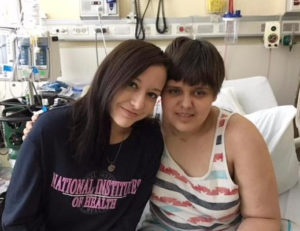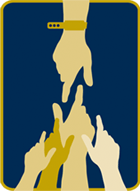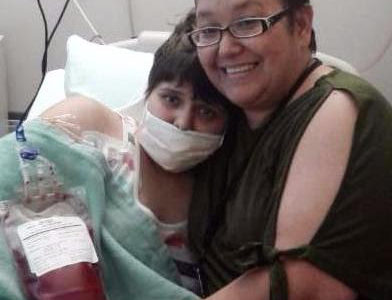Destiny’s journey to the NIH for treatment was not easy. This 20-year-old from Montgomery, Alabama was diagnosed with a rare genetic disease, GATA 2 deficiency. GATA 2 is a gene that makes a protein that plays a role in regulating cells in the bone marrow to make red and white blood cells and platelets. But when something goes wrong and the gene carries a mutation, the resulting GATA 2 deficiency can cause symptoms that are like those of blood cancers.
Destiny and Barbara
A year ago, Destiny experienced fatigue so exhausting that she couldn’t stand. Then high fevers sent her to the emergency room and the intensive care unit. Her extremely low blood counts required immediate transfusions. The University of Alabama Hospital at Birmingham called the Montgomery Cancer Center. “I thought it meant she had leukemia,” said Destiny’s mother, Barbara, her fierce advocate and caregiver. “But after two months, they sent her blood for genetic screening and came up with GATA 2 deficiency. It’s so rare, I couldn’t find out much about it. The University Hospital contacted the NIH.”
Dr. Steven Holland is one of Destiny’s physicians at the National Institute of Allergy and Infectious Disease. “The first step for patients like Destiny is to get the correct diagnosis,” he says, “then treatment for their infection, and then new bone marrow.”
After her diagnosis, there was some good news – one of Destiny’s four sisters, Gabby, age 22, was a perfect match for a bone marrow transplant. “I squealed and did a happy dance,” Barbara recalls when a nurse called to tell them.
But good news was in short supply. Destiny’s grandmother suffered a heart attack and Barbara had to give up her job at an insurance company because she’d missed too many days caring for her daughter. Utility and other bills were piling up, threatening to derail the plan for Destiny to receive the treatment she needed. That’s when Friends at NIH stepped in to help support the family by paying their mortgage. “The donors that give this support are miracle workers,” Barbara said, choking back tears.

Sisters
Happy New Birthday Destiny!
In August, both daughters were admitted to the NIH as inpatients, on different floors. On the day of the transplant, Gabby went to surgery first. A few hours later, Gabby’s lifesaving “gift” was brought to Destiny in an IV bag. The nurses wished her “Happy New Birthday!” There were hugs and smiles all around again when the sisters were reunited in Destiny’s room the next day.
As the family was cautioned by the medical team, recovering from the transplant has been difficult. But Destiny was prepared. “I’m not going down without a fight. And I also know, as a participant in a clinical trial, I’m going to help somebody else,” she said with a big grin. After she fully recovers, Destiny hopes to learn animation and use those skills to entertain others – perhaps even someone going through tough but life-saving medical care.





